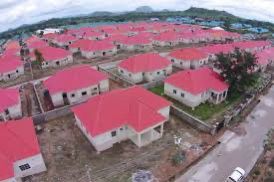/ News
Views: 746
Nigeria’s Housing Crisis worsens as Pension Funds reduce Real Estate Investments

Nigeria’s efforts to bridge its N21 trillion housing shortfall are facing new setbacks as Pension Fund Administrators (PFAs) have drastically reduced their investments in the real estate sector by 91.6% over the past five years. Investigations reveal that this sharp decline is driven by frequent revocation of Certificates of Occupancy (CoO) by state governments, complex regulations, currency depreciation, and broader economic challenges. With Nigeria producing around 600,000 fewer homes than required annually, the nation’s housing deficit, already at 20 million units, continues to expand.
To encourage institutional investment in real estate, the Securities and Exchange Commission (SEC) introduced Real Estate Investment Trusts (REITs) in 2007. Initially, PFAs embraced REITs, increasing their investment from N22.4 billion in 2019 to N239.28 billion in 2020, a remarkable 968% growth. However, this upward trend reversed sharply. By 2021, PFA investment had dropped by 35.8%, followed by a 90.8% plunge in 2022. Despite a slight recovery in 2023, the figure declined again in 2024, falling to N20.06 billion, marking a 91.6% drop from its peak in 2020.
Industry experts highlight the lack of viable REITs as a major reason for this decline. The Pension Fund Operators Association of Nigeria (PenOp)explained, "The continuous drop in REIT investments is primarily due to the limited availability of REITs in the market. Consequently, active funds have redirected their investments toward Private Equity Funds within the real estate sector. Similarly, Obinna Lewis-Asonye, Micro Pension Manager at Stanbic IBTC Pensions, emphasized that some organizations were deterred by regulatory hurdles, stating, "A significant number of institutions hesitated to launch real estate trusts due to market uncertainties. Additionally, many were unable to secure the necessary approvals from the SEC, which is required for such investments in Nigeria."
The nation’s economic downturn and currency instability have further worsened investment prospects. Urban planner and environmentalist Michael Simire attributed the REIT decline to the naira devaluation and a struggling economy, saying, "Currently, numerous commercial and residential properties remain unoccupied. The challenging economic conditions are reducing Nigerians’ purchasing power, leaving many unable to develop or invest in real estate. Simire also noted that many landowners delay property development, hoping for higher resale values, which negatively impacts REITs.
Government policies, particularly the revocation of Certificates of Occupancy, have made investors increasingly wary. Simire explained, "Authorities want rapid urban development, so they prioritize allocating land to individuals who can build immediately. However, this approach contradicts the broader goal of providing affordable housing for all."He warned that these policies deter investors, as they prefer to avoid regions where government interference is high.
Another significant deterrent is the extended payback period for real estate investments. Chief Meckson Innocent Okoro, Principal Partner at M.I. Okoro & Associates, highlighted this challenge, saying, "The current economic climate has reduced demand in the real estate sector. Rising exchange rates have inflated costs, making property development more expensive. A building that once cost N30 million now costs N90 million, tripling the investment. If investors previously expected returns within five years, they now face a 15-year waiting period, which discourages participation in REITs”.
Experts believe that policy reforms and improved financing options are key to reviving PFA investments in real estate. Ivor Takor, Director of the Centre for Pension Rights Advocacy , urged the government to introduce affordable housing loans, subsidies, and tax incentives to stimulate real estate investments. Meanwhile, with the residential property market facing hurdles, many companies are shifting focus to infrastructure funds, targeting investments in roads, energy, and commercial real estate.
Despite the current decline, analysts remain optimistic about the long-term resilience of Nigeria’s real estate sector. While an immediate rebound is unlikely, policy adjustments, economic stabilization, and investor-friendly regulations could help restore confidence in REITs. However, without urgent interventions, the country’s housing crisis will continue to escalate, leaving millions without access to affordable homes.